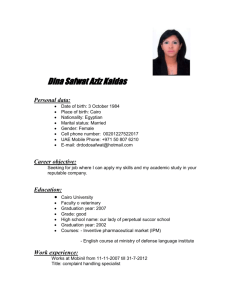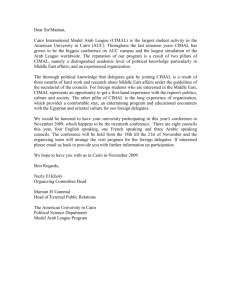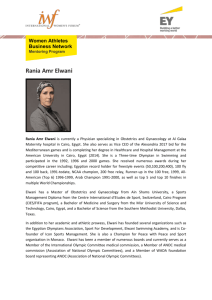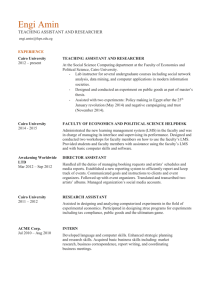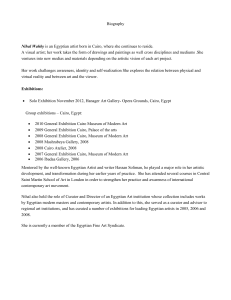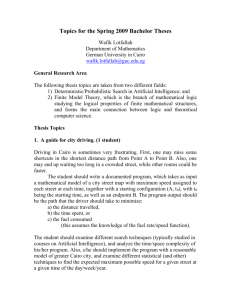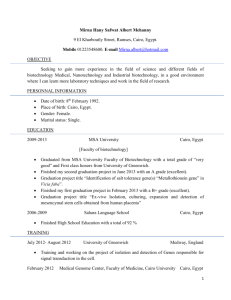Book on the - al-Ghazali website
advertisement
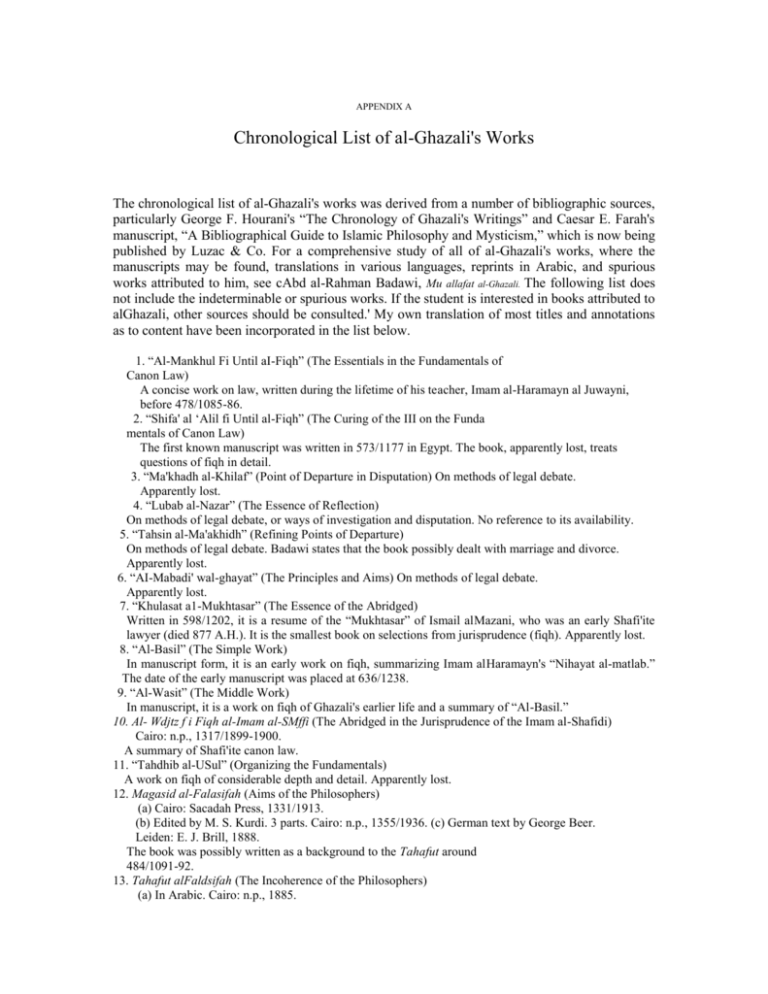
APPENDIX A Chronological List of al-Ghazali's Works The chronological list of al-Ghazali's works was derived from a number of bibliographic sources, particularly George F. Hourani's “The Chronology of Ghazali's Writings” and Caesar E. Farah's manuscript, “A Bibliographical Guide to Islamic Philosophy and Mysticism,” which is now being published by Luzac & Co. For a comprehensive study of all of al-Ghazali's works, where the manuscripts may be found, translations in various languages, reprints in Arabic, and spurious works attributed to him, see cAbd al-Rahman Badawi, Mu allafat al-Ghazali. The following list does not include the indeterminable or spurious works. If the student is interested in books attributed to alGhazali, other sources should be consulted.' My own translation of most titles and annotations as to content have been incorporated in the list below. 1. “Al-Mankhul Fi Until aI-Fiqh” (The Essentials in the Fundamentals of Canon Law) A concise work on law, written during the lifetime of his teacher, Imam al-Haramayn al Juwayni, before 478/1085-86. 2. “Shifa' al ‘Alil fi Until al-Fiqh” (The Curing of the III on the Funda mentals of Canon Law) The first known manuscript was written in 573/1177 in Egypt. The book, apparently lost, treats questions of fiqh in detail. 3. “Ma'khadh al-Khilaf” (Point of Departure in Disputation) On methods of legal debate. Apparently lost. 4. “Lubab al-Nazar” (The Essence of Reflection) On methods of legal debate, or ways of investigation and disputation. No reference to its availability. 5. “Tahsin al-Ma'akhidh” (Refining Points of Departure) On methods of legal debate. Badawi states that the book possibly dealt with marriage and divorce. Apparently lost. 6. “AI-Mabadi' wal-ghayat” (The Principles and Aims) On methods of legal debate. Apparently lost. 7. “Khulasat a1-Mukhtasar” (The Essence of the Abridged) Written in 598/1202, it is a resume of the “Mukhtasar” of Ismail alMazani, who was an early Shafi'ite lawyer (died 877 A.H.). It is the smallest book on selections from jurisprudence (fiqh). Apparently lost. 8. “Al-Basil” (The Simple Work) In manuscript form, it is an early work on fiqh, summarizing Imam alHaramayn's “Nihayat al-matlab.” The date of the early manuscript was placed at 636/1238. 9. “Al-Wasit” (The Middle Work) In manuscript, it is a work on fiqh of Ghazali's earlier life and a summary of “Al-Basil.” 10. Al- Wdjtz f i Fiqh al-Imam al-SMffi (The Abridged in the Jurisprudence of the Imam al-Shafidi) Cairo: n.p., 1317/1899-1900. A summary of Shafi'ite canon law. 11. “Tahdhib al-USul” (Organizing the Fundamentals) A work on fiqh of considerable depth and detail. Apparently lost. 12. Magasid al-Falasifah (Aims of the Philosophers) (a) Cairo: Sacadah Press, 1331/1913. (b) Edited by M. S. Kurdi. 3 parts. Cairo: n.p., 1355/1936. (c) German text by George Beer. Leiden: E. J. Brill, 1888. The book was possibly written as a background to the Tahafut around 484/1091-92. 13. Tahafut alFaldsifah (The Incoherence of the Philosophers) (a) In Arabic. Cairo: n.p., 1885. (b) Texte arabe ctabli et accompagne d'un sommaire latin, by M. Bouyges in Bibliotheca Arabic Scholasticorum II. Beirut: Imprimerie Catholique, 1972. (c) New edition of Bouyges by Majid Fakhry. Beirut: n.p., 1962. A treatise in defense of Muhammadan orthodoxy and on logic, written about 487/1094. According to Hourani, Ghazali stated he “spent `nearly a year' in critical reflection on philosophy, afterward no less than two years spent in understanding it.” 14. AlMustazhiri-Fadd'ih al-Bdtiniyah wa fadd'il al-Mustazhiriyah (Vices of the Esotericists and Virtues of the Exotericists) (a) Selections edited by I. Goldziher. Streitschnft des Gazali gegen die Bahnyja-Sekte. Leiden: E. J. Brill, 1956. (b) Edited by cAbd al-Rahman Badawi. Fada'il al-Batiniyah. Cairo: n.p., 1964. The book is a searching theological critique of Batinism or the Nizari Isma°ilis and deals with the holding of office by the cAbbasid ‘Aliph al-Mustazhir, establishing his legitimacy against the opposition of the Batiniyah sect, and also deals with the Fatimid ‘Aliph al-Mustansir. Rosenthal states that al-Mustazhir “is generously tempered with political realism and preparedness to make concessions to expediency.”' 15. “Hujjat al-Hagq” (Proof of Truth) A reply to criticisms made by the Ta'limis against al-Ghazali in Baghdad. Apparently lost. 16. Mfyar al-°Ilm fi Fann al-Mantiq (The Measure of Knowledge in the Art of Logic) Edited by M. S. Kurdi without the word “Farm.” Cairo: n.p., 1329/1911. A possible appendix to the Tahafut as it explains the technical terms in that work. It is a book on Aristotelian logic. 17. Mihakk al-Nazar fi al-Mantiq (Analytical View on Logic) Edited by Muhammad Badr al-Din al-Na'sani and Mustafa al-Qab bani. Cairo: n.p., 1925. A book on Aristotelian logic. This work, along with Mfydr, was written around 487-488/1094-95. 18. AI-Igtisad fi al-Fligdd (The Mean in Dogmatics) (a) Cairo: Sacadah Press, 1327/1909. (b) Edited by M. Qabbani. Cairo: Adabiyah Press, n.d.; reprinted with the same pagination by Tijariyah Press. Written about 487/1094-95, it is a “constructive” work on dogmas as opposed to Qawd'id al-°Agd'd, which is “destructive,” as stated by alGhazali; a prosaic piece of kalam which he wrote as a Sufi. It is his “chief work of dogmatics.” 19. Mizan al-”Amal (Scale of Action) (a) Edited by M. S. Kurdi and M. S. Nucaymi. Cairo: n.p., 1328/1909 10. (b) 2d ed. Cairo: cArabiyah Press, 1342/1923. (c) Translated by Hikmat Hachem. Critere de P action. Preface by L. Massignon. Paris: Librarie orientate et americaine, 1945. A companion to the Mfydr, the Mizan gives criteria for sound action: Practice (°amal) and knowledge (°ilm) are required for happiness in this world and the next. This was written about 488/1095. 20. “Al-Risalah al-Qudsiyah” Uerusalem Treatise) Possibly written around 489/1096, it is an epistle addressed to the people of Jerusalem and subsequently incorporated into the Ihya' under the rubric Qawd”id al-'Aqd id (The Foundations of the Articles of Faith). 21. Al-Radd al Jamil li-Ilahiydt'Isa bi $aril al-Injil (The Sweet Response to the Theology of Jesus in the Clarification of the Gospels) (a) Edited and translated from Arabic into French by R. Chidiac. Preface by L. Massignon. Paris: Leroux, 1939. (b) Translated into German with comment by F. E. Wilms. Al-Ghazali's Schrift wider die Gottheit fesu, 1966. A polemic against Christian theology, written about 492/1099. 22. Ihyd”Ulum al-Din (The Revival of the Religious Sciences) (a) Numerous editions in Arabic. The one used here was Iraqi's four volume work. Cairo: Halabi, 1967. (b) German translation edited by Ernst Friedrich Tscheeuschner. Butersloh: n.p., 1933. A complete system of Muhammadan moral philosophy in four parts and forty books. Written about 491/1098, it is al-Ghazali's “greatest work” and a complete guide for the devout Muslim to every aspect of the religious life-worship and devotional practices, conduct in daily life, the purification of the heart, and advance along the mystic way. 23. Kitab al-Hikmah fi Makhlagdt Allah (Book of Wisdom in God's Creations) Edited by M. Qabbani. Cairo: n.p., 1321/1903-4. The book deals with the wisdom of God. The attribution of this work to Ghazali was discussed among the historians of Jewish philosophy, and it was said to have been circulated under another name. 24. Al-Risdlah al-Wa'ziyah, in Al Jawdhir al-Ghawdlii min rasd'ii al-Imdm hujjat al-Islam al-Ghazali (The Sermon Epistle Cited in the Precious Jewels of Ghazali's Epistles) Hourani states that it was edited in Cairo in 1353/1934. However, Bouyges claims that it was given this title by Ahlwardt, and was edited in Cairo in 1325/1907 under the title RisdIat al-Wa'z wa al-I'tigdd. 25. Mardqi al-Zulfd (The Degrees of Servile Flattery) This book probably appeared also under the title Mardqi al-Zalaf according to Badawi. Apparently lost. 26. “Al-Imla' fi Ishkalat al-Ihya” (Dictations in the Ambiguities of Ihyd) Written after 500/1110-17, it is a reaction to criticisms of the Ihya' and its banning (no reference as to where, possibly Baghdad). 27. Ayyuhd al-Walad (0 Boy) (a) Edited by G. H. Scherer. Ayyuhd al-Walad Beirut: American Press, 1933. Translated by E. Lator. Beirut: n.p., 1951. (b) UNESCO, International Commission for the Translation of the Classics. 0 Disciple. Beirut: Catholic Press, 1951. (c) Die Beruhmte ethische Abhandlung Ghazali's. Edited by HammerPurgstall. 0 Kind! Vienna: Z. Strauss, 1938. (d) Traduit par Toufic Sabbagh. 0 jeune homme. Beirut: Imprimerie Catholique, 1951, 1969. Hourani gives no indication as to date except that it came after the Ihya'. It is suggested by Scherer that this was one of Ghazali's last works.' It is a letter of faith and conduct, consisting of elementary advice in the sphere of ascetic theology and reiterating his conclusions regard ing the profound meaning of religion. It was originally compiled in Persian. 28. Biddyat al-Hiddyah (Beginning of Guidance) (a) Translated by W. Montgomery Watt. The Faith and Practice of alGhazali. London: Allen & Unwin, 1953, 1963. (This included al-Mun qidh.) (b) J. Heil. Die Religion des Islam, vol. 1. Jena: n.p., 1915, 1923. (c) Edited by Mu§tafa al-Rabi alHalabi. Cairo: n.p., 1334/1912. A collection of pious exhortations leading to salvation, compiled in Persian for the novice. 29. Al-Madnun Bihi “Ald Ghayr Ahlihi (Withheld from Outsiders) Cairo: Maymuniyah Press, 1309/1891-92. Watt states that this book deals essentially with symbolism, revelation and the interpretation of miracles, and the idea that “God is batin (esoteric) because He is so extremely zdhir (exoteric).” It is an exposition of Ghazali's own views. 30. Al-Magsid al-Agsd fi Ma'dni Asmd'Allah al-Husnd (The Farthest Aim in the Meanings of God's Beautiful Names) (a) Cairo: Sharafiyah Press, 1328/1910-11. (b) In a recent edition, the title has been “al-Asna” rather than “al Agsa.” Beirut: Dar al-Mashriq, 1971. An exposition of divine names. 31. Mishkdt al-Anwdr (The Niche for Lights) (a) Cairo: n.p., 1353/1934. (b) A translation with introduction by William Henry Temple Gairdner. London: The Royal Asiatic Society, 1924. This book contains his developed mystical doctrines and further theo logical and anti-Batini essays. 32. Qawasim al-Bdtiniyah (Divisions of the Esotericists) Arabic and Turkish text, translated by Ahmed Ates. Ilahiyat Fakultesi dergisi, 3(1-2) (1954): 23-54. Hourani and Badawi indicated in their listings that it was apparently lost. However, Farah states that there appears to be a translation by Ates. It was mentioned that it referred to Taclimis and presumably was listed as “Mawahim al-Batiniyah” in the Tabaqdt of Subki. 33. Jawab Mufacsal al-Khilaf (Answering Details of Disputation) The Munqidh describes it, according to Hourani, as a reply to criticisms made against Ghazali in Hamadan, and a refutation of the Tarlimis. Hourani further asserts that “it is not known whether or when Ghazali was in Hamadan.” Apparently lost. 34. Jawdhir al-Quran (jewels from the Koran) Cairo: Rahmn niyah Press, 1352/1933. Bouyges states that al-Ghazali discloses in this book the Essence, the Attributes, the Acts (of God), and the Return (to God). It is a collection of selected verses. 35. Al-Arbadin fi Usdl al-Din (The Forty Fundamentals of the Faith) Cairo: “Arabiyah Press, 1344/1926. It is a short summary of the Ihyd i 36. Al-Qistas al-Mustagim, in 41Jawdhiral-Ghawdli (The Straight Measure, in The Precious jewels) (a) Cairo: n.p., 1353/1934. (b) Edited by le Pere Victor Chelhot. Beirut: Catholic Press, 1959. The book justifies the use of Aristotelian logic in religious matters; a treatise on ethics. 37. Faysal al-Tafiigah Bayn al-!slam wa al-Zandaqah, in Al Jawdhir al Ghawdli (The Points of Separation Between Islam and Apostasy) (a) Edited by Mu~tafa al-Qabbani. Cairo: n.p., 1901. (b) Cairo: n.p., 1353/1934. (c) Edited by Hans Joachim Runge. Uber Gazali's Faisal al-tafriga baina 'l-Islam wa '-Zandaga. Kiel: n.p., 1938. This is partly directed against the Batiniyah, and is a defense of his own writings against the charge of heresy. 38. “Kitab al-Darj” (Book of Recording) As mentioned in Munqidh, this book is an answer to “feeble” criticisms by the Tadlimis against Ghazali in Tus. Apparently lost. 39. Kimiyd-Yi Sa'ddat (Alchemy of Happiness) (a) In Persian. Bombay: n.p., 1321/1903. (b) Translated from the Turkish by Henry A. Homes. The Alchemy of Happiness. Albany, NY: J. Munsell, 1837. In Persian. Kimiyd'al-Sa”ddah. The Alchemy of Bliss; A Treatise on Ethics. Lucknow: n.p., 1865. (c) Translation into English by C. Field of eight chapters of the Urdu version. The Alchemy of Happiness. London: n.p., 1910. The original is in Persian and was possibly written when al-Ghazali was at the zdwiya (Sufi monastery) in Tus. Hourani states that it is “an abridged popular version of the Ihyd'. The book develops the concept that happiness is knowledge and action, and Ghazali discusses the attain ments of each. 40. Al-Munqidh min al-Daldl (Deliverance from Error) (a) In a collection with Kitab ilghdm al-°awdm; al-madndn bihi 'ala ghayri ahlihi: al-madnun alsaghir al-mawsdm bi al-ajwibah al-Ghazzdliyah fi almasd'il al-ukhrawiyah. Cairo: Maymitniyah Press, 1309/1891. (b) Edited by J. Saliba and K. cAyyad. Damascus: n.p., 1358/1891. (c) Translated by Barbier de Meynard. “Traduction nouvelle du Traite de Ghazzali, intitule Le Preservattif de l'erreur et Notices sur les extases (des Soufis).” Journal Asiatique, 73 ser., 9 (1877):5-93. (d) In Dutch. Uit bet Arabisch vertaald en toegelicht door, by J. H. Kramers. De redder uit de dwaling. Amsterdam: Arbeiderspers, 1951. (e) Cairo: n.p., 1952. (1) Edited by F. Jabre. Beirut: n.p., 1959. The book is an account of the development of his religious opinions and includes his conversion to Sufism. It is equated to the Confessions of St. Augustine. Bagley states that it is “also an apology for Sufism.” 41. Al-Mustasfa min 'Ilm al-USdl (The Condensation of the Science of Fundamentals) 2 vols. Cairo: Tijariyah Press, 1356/1937. A treatise on jurisprudence, it embodies also a part of his lectures from three years of teaching at the Nizamiyah. It was written possibly around 499/1106. 42. Al- Tibr al-Masbdk ft Nasihat al-Muldk (Counsel for Kings) (a) In Persian. Edited by Jalal Huma'i. Tehran: n.p., 1317/1899. (b) Translated by F. R. C. Bagley. Ghazali's Book of Counsel for Kings. London: Oxford University Press, 1964. (c) Cairo: n.p., 1317/1899. (d) Also on margins of Sirdj al-Muldk (Persian text) of Ibn al-Rundakah. 1888. Hourani states that this is addressed to the Seljuq Sultan Muhammad Ibn Malikshah, whose reign began in 1105. 43. 1 jam al-`Awdm'An 'Ilm al-Kalam (Restraining the Masses from Theological Disputation) (a) First printed in Istanbul in 1278/1861. Cairo: Maymtiniyah Press, 1309/1891-92. (b) In a collection; see Al-Munqidh. Cairo: Maymtiniyah Press, 1309/1891. Completed in the year of Ghazali's death, December 18, 1111. It “warns of the dangers in the study of kalam for those with little education.”
